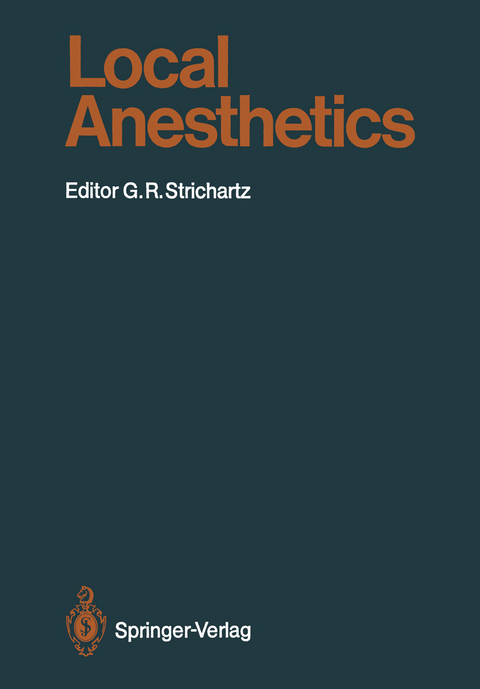
Local Anesthetics
Springer Berlin (Verlag)
978-3-642-71112-1 (ISBN)
1 Some Aspects of the History of Local Anesthesia.- A. Introduction.- B. Freud, Koller and the Early History of Cocaine.- C. Structure and Synthesis of Local Anesthetics.- D. Epinephrine and Local Anesthesia.- E. Toxicity of Local Anesthetics.- F. The Nervous Impulse and the Action of Local Anesthetics.- G. Pharmacokinetics of Local Anesthetics.- H. Summary and Conclusions.- References.- 2 The Action of Local Anesthetics on Ion Channels of Excitable Tissues.- A. Introduction.- B. Physiological Basis of Generation of the Action Potential.- C. The Action of Local Anesthetics on Sodium Channels.- D. Current Questions in Local Anesthetic Action.- E. New Kinds of Local Anesthetic Agents.- F. Effects of Local Anesthetics on Potassium Channels.- G. Conclusion.- References.- 3 Structural Elements which Determine Local Anesthetic Activity.- A. Introduction.- B. Structure and Physico-Chemical Properties of Local Anesthetics.- C. Resolution of Structural Contributions to Potency.- D. Comparisons of Nerve Blocking Actions with Antiarrhythmic Actions of Local Anesthetics.- E. Models for Local Anesthetic Receptors.- References.- 4 Mechanisms of Differential Nerve Block.- A. Introduction.- B. Historical Discussion.- C. Confirmations, Extensions, Clarifications, and Contradictions.- D. Summary and Conclusion.- References.- 5 Pharmacokinetics of Local Anesthetics.- A. Introduction.- B. Factors Affecting the Interpretation of Local Anesthetic Blood Concentrations.- C. Metabolism.- D. Pharmacokinetics in Man.- E. Factors Affecting Pharmacokinetics of Local Anesthetics.- F. Pharmacokinetics in Experimental Animals.- References.- 6 Toxicity and Systemic Effects of Local Anesthetic Agents.- A. Effects on the Central Nervous System.- B. Effects on the Cardiovascular System.- C. Effects on theNeuromuscular Junction.- D. Miscellaneous Effects.- E. Other Toxicological Effects.- F. Treatment of Systemic Toxicity.- G. Local Tissue Toxicity.- H. Summary.- References.- 7 The Role of Local Anesthetic Effects in the Actions of Antiarrhythmic Drugs.- A. Introduction.- B. Electrophysiology of Cardiac Fibers.- C. The Effects of Local Anesthetics on Cardiac Fibers.- D. Antiarrhythmic Effects of Local Anesthetic Agents.- E. Conclusion.- References.- 8 Central Effects of Local Anesthetic Agents.- A. Introduction.- B. Routes of Entry of Local Anesthetic Agents into the CNS.- C. Behavioral Pharmacology of Local Anesthetic Agents.- D. Effects of Local Anesthetics on Electrical Activity of the Brain.- E. Anticonvulsant Properties of Local Anesthetics.- F. Temporal and Spatial Effects of Local Anesthetics at Regional CNS Sites.- G. The Mechanisms Underlying Local Anesthetic-Induced Seizures.- H. Central Nervous System Metabolic Effects of Local Anesthetics.- I. Summary.- References.
| Erscheint lt. Verlag | 17.11.2011 |
|---|---|
| Reihe/Serie | Handbook of Experimental Pharmacology |
| Co-Autor | G.R. Arthur, K.R. Courtney, B.G. Covino, J.M. Garfield, G.A. Gintant, A.J. Gissen, L. Gugino, B.F. Hoffman, S.A. Raymond, J.M. Ritchie, G.R. Strichartz, L.D. Vandam |
| Zusatzinfo | XII, 294 p. |
| Verlagsort | Berlin |
| Sprache | englisch |
| Maße | 170 x 244 mm |
| Gewicht | 540 g |
| Themenwelt | Medizin / Pharmazie ► Medizinische Fachgebiete ► Anästhesie |
| Medizin / Pharmazie ► Medizinische Fachgebiete ► Pharmakologie / Pharmakotherapie | |
| Medizin / Pharmazie ► Pharmazie ► PTA / PKA | |
| Schlagworte | anesthesia • intubation • Pain |
| ISBN-10 | 3-642-71112-X / 364271112X |
| ISBN-13 | 978-3-642-71112-1 / 9783642711121 |
| Zustand | Neuware |
| Haben Sie eine Frage zum Produkt? |
aus dem Bereich


